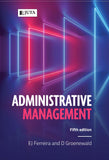
Forensic Investigation: Legislative Principles and Investigative Practice (2015)
About this Publication:
The field of forensic investigation has grown significantly in South Africa over the past few years. This growth in the field is mostly due to the fact that investigations are now also undertaken by private and corporate bodies, and by government institutions other than the South African Police Service. The field of investigation has moved from being the sole domain of the police to including other role-players. The latest developments in the forensic investigation discipline are a result of the fact that forensic investigation is a continually evolving science. The new democratic dispensation also requires that all investigations must be conducted within the ambit of the Constitution.
The authors of Forensic Investigation: Legislative Principles and Investigative Practice aim to meet the needs of this field by examining how forensic investigations should be conducted in South Africa, with reference to local legislative principles and scientific processes.
Forensic Investigation: Legislative Principles and Investigative Practice commences by covering aspects such as the constitutional basis for public and private policing, the investigation process, and the characteristics of a good investigator. The book highlights the basic concepts of investigation and then proceeds to examine more sophisticated specialised aspects, such as medico-legal evidence, DNA, and policing in a cyber-world. The work also features more recent developments in the field, such as analysing the behaviour of offenders and the choices they make during the commission of crimes. These aspects are dealt with in relation to forensic geography and offender profiling.
Forensic Investigation: Legislative Principles and Investigative Practice takes the reader from the scene of the incident (the crime scene) to the courtroom, and from investigation to prosecution – all essential components of the investigative process. The book explores the significant role and conduct of an investigator, seeking to ensure that current and future generations of investigators are aware of the challenges and changes in the investigation of crimes, incidents and transgressions, and are also familiar with the prosecution processes that follow. This book will undoubtedly prove to be an invaluable and essential tool for all investigators.
Contents Include:
- Tables of Statutes and cases
- Acronyms and abbreviations
- Forensic investigation of crime, regularities and transgressions - B Benson, G Jones and J Horne
- Principles of investigation - T Budhram and J van Graan
- Medico-legal evidence - J Smith and R J Mokwena
- Serological evidence and DNA analysis – M S Manamela, J H Smith and R J Mokwena
- Imprint evidence and other specialties - M S Manamela and R J Mokwena
- The preliminary investigation phase - M van der Watt
- The further investigation phase - T van Niekerk, H Lochner and Y Naidoo
- The judicial phase of investigation - J Jordaan and S Dintwe
- Criminal investigative analysis: an applied perspective - G Labuschagne
- Forensic geography - P M U Schmitz and A K Cooper
- Digital forensics and cybercrime - J Jordaan
- Developments in forensic technology - J H Smith and R Zinn
-
Annexures
- Example of a Section 212 statement (drugs)
- Example of a Section 212 statement (ballistics)
- Example of the structure of a statement
-
Example of a detailed statement with annexures
Of Interest and Benefit to:
- Undergraduates of evidence or criminal procedure
- Trainee detectives
- Investigators
- Magistrates
- South African Revenue Services
- The banking sector
- HAWKS Directorate for Priority Crime Investigation (DPCI)
- Special Investigation Unit (SIU)
We Also Recommend





